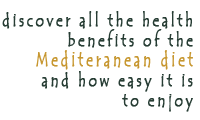Find out and more ... free Mediterranean Menus, recommended foods, plus healthy eating and living tips ...

|
What is the Mediterranean Diet? What are the Mediterranean diet foods? What's
so great about the Mediterranean diet? Find out and more ... free Mediterranean Menus, recommended foods, plus healthy eating and living tips ... |
 |
| This section, aka healthymediterraneans.com, was another web site, that was bought out to make this cholesterol site even more complete. |
The Mediterranean Diet Food PyramidWe're all familiar with the Food Pyramid, a simple diagram that replaced the old four food groups in the 1990s. This triangular diagram, issued by the US Department of Health, clearly shows the general nutritional guidelines eating sensibly, as dictated by that department. It recommends that the greater portion of our diets (at the bottom of the pyramid) be made up of bread, cereal, and other carbohydrates. Fruits and vegetables are the next most important, according to this food guideline, at 2-4 and 3-5 recommended servings per day. Daily products and proteins are next, at 2-3 servings each per day, and fats and sweets are at the top, meant to be used only a little, if at all. However, recent research has shown that this pyramid is flawed. For instance, the heavy reliance on carbohydrates doesn't specify what kind, causing many people to rely on processed foods. Animal fats are also heavily consumed if you eat according to the food pyramid. Studies have shown that consumption of lots of processed carbohydrates and animal fats can lead to obesity, heart problems, and other health issues. So, if the Food Pyramid isn't a good guideline, what is? Over the years, data has suggested that the parts of the Mediterranean region that have the lowest rates of disease and the highest life expectancies are those that eat a particular type of diet. Since this region includes many different countries, the specifics of this diet vary from location to location. However, they all have a few things in common. Much of the diet is made up of food from plant sources. This means breads, grains, and other carbohydrates, with an emphasis on whole grains, vegetables and fruit, and seeds, nuts, and other legumes. Food is minimally processed and eaten as fresh as possible. The primary fat is olive oil, not butter, hydrogenated oils, or animal fats, as it often is in the United States. However, this oil isn't used sparingly. People in these areas eat it regularly, yet don't seem to suffer bad health because of it. Fish and poultry make up a low to moderate portion of the diet, and red meat is eaten only infrequently. Wine is drunk regularly, but in moderate amounts with meals. Various factors of these foods interact to help prevent heart disease, and even, it appears, to reduce the cancer rate. Relying on olive oil, which is a monounsaturated fat, instead of cholesterol-containing saturated fats, is better for our hearts. Red wine (and grape juice) contain antioxidants, which can help prevent cell damage. Fresh, varied fruit and vegetable choices mean more vitamins and minerals, and easier consumption of all the nutrients we need. Unprocessed grains provide calories to fuel our bodies, but are more filling than the processed type, and provide more nutrients, too.
So, if you'd like to emulate the Mediterranean diet, and thus improve your health, a new Food Pyramid is in order. At the bottom, we'll place unprocessed grains and other carbohydrates, including bread, pasta, bulgar, potatoes, couscous, lentils, and others. Next should be fruits and vegetables, as well as beans, nuts, and legumes. These should be eaten daily, and should make up a large proportion of the diet, along with breads and other carbohydrates. After that, the other thing to eat on a daily basis is olive oil. In the Mediterranean Food Pyramid, as much as thirty percent of the calories you get each day can be made up of fats. However, they should be good fats – from vegetable sources like olives, nuts, and avocado – not animal fat from butter, cheese, and red meat, or processed fats like margarine. Cheese and yogurt can also be consumed daily, but only in small amounts. Fish is next, and should only be eaten a few times every week. It and poultry should provide the majority of the calories from animal sources, since they are lean. Eggs may also be eaten, but remember that the average person on the Mediterranean Diet eats four or fewer eggs per week. You should also cut sweets back to a few times per week. This can mean cooking with less sugar, and looking for substitutes such as fruit juice in baking. While things might not seem sweet enough at first, you'll soon adjust, and wonder how you ever managed to eat so much! In contrast with the way most Americans eat, red meat is at the top of this pyramid. You can still have it, but should keep consumption to a few times a month, and try to eat no more than a pound over the course of the month. Small amounts at a time are best. Look for leaner cuts, if the flavor of the meat can still be preserved. © 2008 www.healthymediterraneans.com All Rights reserved
|
Latest Articles & FeaturesLower your Cholesterol Naturally.Guide to the Food Pyramid. Healthy Meals Don't Have To Be Boring. What is the Mediterranean Diet? The Mediterranean Diet Food Pyramid Mediterranean Spices
Mediterranean Dietary StudiesAccording to New Study: Mediterranean Diet Better.Mediterranean diet could protect elderly from vein problems. Blueberry compounds linked to colon cancer prevent. What's a Food Pyramid?
|
© 2008-present www.cholesterolcholestrol.com Healthy Mediterraneans diet All Rights Reserved Home | Articles | Features | Contact | Sitemap | Google Sitemap | Yahoo Sitemap | RSS |